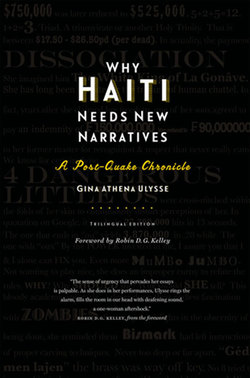Читать книгу Why Haiti Needs New Narratives - Gina Athena Ulysse - Страница 20
На сайте Литреса книга снята с продажи.
Оглавление8
Tout Moun Se Moun Everyone Must Count in Haiti
April 10, 2010 (not published)
Tout moun se moun, men tout moun pa menm. All people are human, but all humans are not the same. Nothing reflects this Haitian proverb more than the impact of Goudougoudou—as Haitians have dubbed the January 12 earthquake—and its aftermath, and that includes plans for reconstruction.
In recent weeks, reporters, bloggers, and concerned Haitian advocates at home and abroad have cried foul over the exclusion of civil society from closed-door meetings that preceded the United Nations Haiti’s donors conference on March 31. In spite of the rhetoric of unity that dominated the conference, it is undisputed that the key players in Haiti (the World Bank–led committee, the UN special envoy, the CBHF [Clinton Bush Haiti Fund], the government of Haiti, the business elite, as well as many of the NGOs and missions running amok on the ground) not only failed to substantively consult and integrate civil society, but are proceeding with business as usual without the input of those most affected by Goudougoudou.
Responses on Listservs and in private conversations to the disregard of pep la (the people) range from absolute outrage (who do they think they are?) to total capitulation (there is nothing we can do). One thing is clear, on either side of the coin: those who know Haiti and its deep history of state against nation, as anthropologist Michel-Rolph Trouillot calls it, see the danger signs ahead, and they are blazing. Implementation of uncoordinated and exclusive plans is a man-made disaster in the making.
I’m cautiously optimistic that another Haiti is still possible, but only if approaches to rebuilding encompass a much broader sector of the population and reconsider existing organizations that have historically excluded them. Indeed, without new structural approaches, and full inclusion of Haitians, attempts to get Haiti right or build it better—as Bill Clinton continues to espouse using archaic development models and a state system based on patronage—are not only doomed, but certain to implode again.
In Haiti, grassroots organizations are weary of being continually bypassed by the Haitian government. They want a state that is accountable to its citizens, not to the international community. Yet they also know that ultimately decisions concerning Haiti’s future are in the hands of donors, international financial institutions, and the NGOs that have replaced the state over the years. Civil society is rightfully demanding participation in rebuilding processes precisely because the catastrophic earthquake need not be in vain and can be used to create a Haiti where all citizens and not just those with money and the right connections will have equal access to health care, food, education, and housing.
Haitians in the diaspora are as determined to ensure that Haiti will not be the same as it was. Hence the call to build Haiti anew. They are collaborating, organizing, protesting, and holding discussions on how to make interventions, since the train has already left the station, as many of us like to say. While many are positioning themselves for the windfall, others are seeking to be players and advocates for those who were left out of the process and make sure their voices are heard.
One such effort was the conference Haitians Building Haiti: Towards Transparent and Accountable Development that took place in Boston on March 26–27 before the UN conference. Participants included members of Haitian civil society, the Haitian diaspora (academics, activists, and professionals), members of the government of Haiti and the U.S. government, international financial institutions, the United Nations, and NGOs, all engaged in a dialogue to “envision and define a new paradigm for the rebuilding of Haiti.”
Another example is the coalition of women working both in the international arena and on the ground in Haiti under the umbrella of Poto Fanmfi (a coalition is support of women and girls) to produce a Gender Shadow Report to the government of Haiti’s Post-Disaster Needs Assessment (PDNA) that specifically addresses the concerns of women and girls.
The two-day Boston meeting was the collaborative undertaking of the Barr Foundation, the Boston Foundation, the National Haitian American Elected Officials Network (NHAEON), and the University of Massachusetts William Trotter Institute and Barr Fellows. At this working conference, Haitians took center stage and engaged in conversation with each other about future possibilities. One outcome of this encounter was the call for more dialogue with other representatives, but most importantly those in Haiti.
It is interesting to note the genesis of the Boston conference. The Boston-based foundations named met with local Haitian leaders in Massachusetts and simply asked, How can we help you with Haiti? In so doing, they used a different set of rules of engagement without the paternalism characteristic of relations between donors and recipients. This unprecedented move is one that major players in Haiti holding the purse strings ought to put in practice, especially with civil society leaders, if indeed all Haitians are to be treated as if tout moun se menm.
